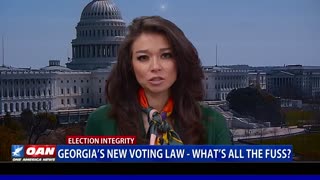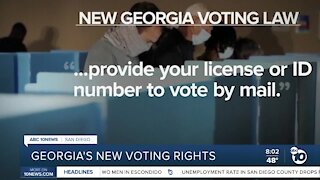Premium Only Content

What Does Georgia's New Voting Law SB 202 Do? By Stephen Fowler, Summarized by ASL Patriot Broadcast
ROUGH TRANSCRIPT:
Signed excerpt from
and summarized by Lance of ASL Patriot Broadcast.
What Does Georgia's New Voting Law SB 202 Do?
Changes to absentee voting
Voters over 65, with a disability, in the military or who live overseas will still be able to apply once for a ballot and automatically receive one the rest of an election cycle. But the earliest voters can request a mail-in ballot will be 11 weeks before an election instead of 180 days — less than half as much time.
The final deadline to complete an application is moved earlier, too. Instead of returning an application by the Friday before election day, SB 202 now backs it up to two Fridays before. Republican sponsors of the bill and local elections officials say this will cut down on the number of ballots rejected for coming in late because of the tight turnaround.
Counties will also begin mailing out absentee ballots about three weeks later than before, starting four weeks before the election.
Requesting and returning a ballot will also require new ID rules: either your driver's license number, state ID number or, if you don't have those, a copy of acceptable voter ID.
The law also allows for applications to be returned online, after the Secretary of State's office launched an online request portal using your driver's license number or state ID number ahead of November's general election.
Poll workers will use that information, plus your name, date of birth and address, to verify your identity, and you will sign an oath swearing that everything is correct. This is a change from recent procedure that would check your signature on the application with those on file.
State and local governments are no longer allowed to send unsolicited applications, and third-party groups that send applications have new rules to follow, too. Their applications must be clearly marked as being "NOT an official government publication" that it is "NOT a ballot," and must clearly state which group is sending the blank request.
Plus, third-party groups are only allowed to send applications to voters who have not already requested or voted an absentee ballot. The groups potentially face a penalty for each duplicate sent. What is this third party thing? I looked it up and it's when a group is trying to push their favorite party they will try to send you an application for a ballot. Is this legal? I checked ABC news and they said, “This is perfectly legal, as long as the groups are complying with state guidelines, but it comes with the added cost of confusion to voters and frustration to local election officials who may receive more than one absentee ballot application from a single voter.”
The actual absentee ballot and envelopes will look different, as well. SB 202 requires absentee ballots to be printed on special security paper, and your precinct name will now be included along with precinct ID printed at the top. Once you fill out your choices by filling in the circles for your choices, you will place it in an envelope that will have your name, signature, driver's license or state ID number (or last four digits of your Social Security number) and date of birth. The envelope will be designed so that sensitive personal information will be hidden once it is sealed.
Military and overseas voters will have an additional set of absentee ballots mailed to them with their regular ballots — ranked choice instant-runoff ballots. Georgia's runoffs will now be four weeks long instead of nine weeks, but federal law requires ballots to those voters be sent out by 45 days before a federal election. So now, those voters will be given these ranked choice ballots, where they rank their choices for certain races in the event they head to a runoff, and send them back with their primary or general election ballots.
Secure absentee ballot drop boxes — which did not exist a year ago — are now officially part of state law, but not without some new changes. The law now requires all 159 counties to have at least one drop box, caps the number of boxes at one per 100,000 active voters or one for every early voting site (whichever is smaller) and moves them inside early voting sites instead of outside on government property. Additionally, the drop boxes will only be accessible during early voting days and hours instead of 24/7.
One of the biggest changes in the bill would expand early voting access for most counties, adding an additional mandatory Saturday and formally codifying Sunday voting hours as optional. Counties can have early voting open as long as 7 a.m. to 7 p.m., or 9 a.m. to 5 p.m. at minimum. If you live in a larger metropolitan county, you might not notice a change. For most other counties, you will have an extra weekend day, and your weekday early voting hours will likely be longer. BUT If you live in Fulton County, you'll no longer be able to use one of two mobile voting buses the county purchased last year to help with long lines.
For polling place changes or closures, the law now requires better notice of those changes, including a 4-by-4-foot sign that shows where the new location is.
Another new rule that affects both in-person early voting and election day voting would prohibit anyone except poll workers from handing out water to voters in line, and outlaw passing out food and water to voters within 150 feet of the building that serves as a poll, inside a polling place or within 25 feet of any voter standing in line. Depending on the location, it is still possible for third-party groups to have food and water available — and it is possible for the lines to extend beyond 150 feet.
During early voting, counties must publicly report daily how many people have voted in person, how many absentee ballots have been issued, returned, accepted and rejected. Early voting sites and times must be published publicly ahead of time.
For runoffs, things would be tighter: the law says early voting should start "as soon as possible" after a primary or general election, and requires in-person early voting the Monday through Friday before the election. This means counties may not be able to offer weekend early voting depending on how quickly it takes them to finish the first election and prepare for the second.
A change local officials embrace is a section that allows them to begin processing, but not tabulating, absentee ballots starting two weeks before the election. There's extra incentive to do so, by way of a new requirement that counties count all of the ballots nonstop as soon as polls close and finish by 5 p.m. the next day or potentially face investigation.
Plus, local officials are required to post and report the total number of ballots cast on election day, during early voting, via absentee voting and provisional ballots, all by 10:00 p.m. on election night, essentially providing the public with a denominator to understand the total possible votes out there as results trickle in. I looked up Provisional ballots and it means “In elections in the United States, a provisional ballot (called an affidavit ballot in New York) is used to record a vote when there are questions about a given voter's eligibility that must be resolved before the vote can count. The federal Help America Vote Act of 2002 guarantees that, in most states, the voter can cast a provisional ballot if the voter states that they are entitled to vote.[1]
Some of the most common reasons to cast a provisional ballot include:
The voter's name does not appear on the electoral roll for the given precinct (polling place), because the voter is not registered to vote or is registered to vote elsewhere
The voter's eligibility cannot be established or has been challenged
The voter lacks a photo identification document (in jurisdictions that require one)
The voter requested to vote by absentee ballot but claims to have not received, or not cast, the absentee ballot
The voter's registration contains inaccurate or outdated information such as the wrong address or a misspelled name
In a closed primary (limited to members of a political party), the voter's party registration is listed incorrectly[1]
Whether a provisional ballot is counted is contingent upon the verification of that voter's eligibility, which may involve local election officials reviewing government records or asking the voter for more information”
Speaking of provisional ballots, out-of-precinct provisionals will not count anymore unless cast after 5 p.m. and a voter signs a statement saying they could not make it to their home precinct in time.
Now that counties must finish tabulating all the votes by 5 p.m. the day after the election, lawmakers moved up their election certification deadline to six days after polls close instead of 10.
Absentee ballots will be checked using the ID information voters write on the outside envelopes instead of their signatures, another departure from previous policy.
Addresses small changes in countries with lower-turnout races dealing with voting equipment- It says One change buried in the bill would give county elections officials greater flexibility with voting equipment for smaller, lower-turnout races. Previous law requires one ballot-marking device per every 250 active voters. Statewide general elections would still require that ratio, but any other election would be subject to the local elections officials' discretion, based on expected turnout, the type of election, number of people that have already voted and more. Counties will also have to provide better notice of public logic and accuracy testing of voting machines and equipment, where officials calibrate every piece of technology used in the election. In the 2020 election, many rural and urban counties received grant funding from philanthropic outlets such as the Center for Tech and Civic Life and the Schwarzenegger Institute. Under the new law, those elections offices could no longer directly receive funding. But the State Election Board is slated to propose a method to receive donations and distribute them equitably by October 2021. Another change that is now law would require large polling places with long lines to take action if wait times surpass an hour at certain times during the day. Those massive polls with more than 2,000 voters and wait times longer than an hour would have to hire more staff, add more workers or split up the precinct after that election. More than 1,500 of Georgia's precincts have over 2,000 voters. bill requires poll watchers be trained before allowing them to work, and gives local officials the authority to set where those watchers can observe from.
Poll workers, in short supply for the June 2020 primary because of the pandemic, may now serve in adjoining counties.
Scanned ballot images will now be subject to public records disclosures, and the secretary of state's office shall create a pilot program for posting those images online as well.
Changes affecting the State Election Board refers to The secretary of state, whom, will no longer chair the State Election Board. The new chair would be nonpartisan but appointed by a majority of the state House and Senate. The chair would not be allowed to have been a candidate, participate in a political party organization or campaign or made campaign contributions for two years prior to being appointed. The law also says the governor should appoint someone if the position becomes vacant when lawmakers are not in session. Other changes to the State Election Board's powers would give the board — and by extension, the legislature — more power to intervene in county elections boards that are deemed underperforming. Suppose they need more help- the State Election Board has more power now to get things done quicker.
In addition to the legislature-appointed chair, the five-member board is made up of one member appointed by the House, one appointed by the Senate and one each picked by the Democratic and Republican state parties. The State Election Board, county commissions or a certain number of state House and Senate members that represent a county could request an independent group to conduct a performance review of their appointed elections board or probate judge that supervises elections, defined in Georgia law as the "superintendent." SB 202 would allow the State Election Board to suspend the multi-person elections board or probate judge and replace them with a single individual for at least nine months.
The election superintendent is responsible for everything from certifying results, handling polling place changes and hearing challenges to voters' eligibilities — something that SB 202 clarifies that must be heard in a timely manner after being filed and can include an unlimited number of challenges.
The board could only temporarily suspend up to four election superintendents at a time. [Imagine that!]
the law says the Attorney General's office shall have the authority to set up a hotline for people to file complaints about voter intimidation and "illegal election activities," including anonymous tips. That section also says the AG's office shall have the authority to review the complaints within three business days (or as "expeditiously as possible") and determine if the complaint should be investigated.
The State Election Board and secretary of state's office would not be allowed to enter into any settlement agreements for election lawsuits without notifying lawmakers first. New language for certain judicial vacancies or candidates who die before election day has been added and the legislature has reiterated the state should be part of a multi-state voter registration database.
Because of the delays in the 2020 census, the law also allows some of the municipal boundary line redrawing to wait until after upcoming elections. This gives you an idea of what the bill does. Nothing too bad, right? All those things required are common sense. OH well. Will it work out? We shall see...
https://www.gpb.org/news/2021/03/27/what-does-georgias-new-voting-law-sb-202-do?fbclid=IwAR1eG2MJOeO1f4tQNAupiW_P_ojxvIC-CEF_VqaQNUdKZWqqlNDpf7_-2N0
https://www.facebook.com/ASLPB2020
https://www.facebook.com/ASLPatriotBroadcast/
https://www.facebook.com/DeafPatriot
MeWe link: https://mewe.com/join/aslpatriotbroadcast
Gab link: https://gab.com/ASLPatriotBroadcast
Rumble link: https://rumble.com/user/ASLPatriotBroadcast
YouTube link: YOU ARE KIDDING ME. NO MORE CENSTUBE.
-
 24:18
24:18
Twins Pod
4 years agoGeorgia's New Voting Law SB 202?
16.7K207 -
 4:14
4:14
One America News Network
4 years agoGeorgia's New Voting Law - What's All the Fuss?
6.74K36 -
 3:41
3:41
One America News Network
4 years agoTipping Point - Georgia's Voting Law Changes with Autry Pruitt
2.44K20 -
 4:34
4:34
CampusReform
4 years ago $0.04 earnedStudents support voting bill...then learn it's actually Georgia's law
1604 -
 1:08
1:08
KGTV
4 years agoNew Georgia voting law
51110 -
 9:39
9:39
MattMorseTV
12 hours ago $0.74 earnedVance just DROPPED a BOMBSHELL.
26K60 -
 23:47
23:47
GritsGG
1 day agoThe Forgotten Best Sniper Support AR!
2.47K2 -
 1:15:48
1:15:48
The Pascal Show
14 hours agoMUGSHOTS RELEASED! Emmanuel Haro's Parents Mugshot Released To The Public
1.7K -
 14:45
14:45
BlabberingCollector
17 hours agoKings Cross Station SET LEAKS! | Harry Potter HBO Show Update & News
1.69K -
 33:20
33:20
SB Mowing
9 days agoHealth Struggles + Endless Rain = A Yard Out of Control
10.2K18